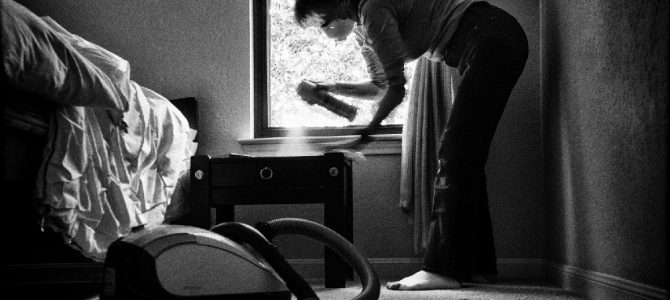
Once upon a time, as a middle-class teenager whose parents would have laughed in my face had I asked them for money, I used to clean other people’s houses. Among my handful of clients was a family in which both parents worked. They had three teenage kids, one of whom had been a childhood friend. We had fallen out of touch like kids do.
Most jobs I have worked, I have liked or learned to like. House cleaning was the one exception. It was tedious and at times revolting (there’s just something about other people’s dirty houses). Especially in the case of the client with teenage kids, it was humiliating.
Why? I was 16 and making way above minimum wage. I could easily adjust my hours around my schedule. For a young person with no prior work experience, it was a killer job. But it was nearly impossible not to feel a sense of personal degradation as I emptied trash cans, cleaned toilets, and wiped Hot Pocket shrapnel out of the microwave while my clients’ able-bodied children sat in their rooms playing video games or watching TV.
It was hard to get my head around the fact that the teenage girl who awkwardly said “Hi” then hurried back into her room was the same one I had plotted pranks with at sleepovers and birthday parties just a few short years earlier. The work I was doing in her home made me feel more than incidentally distant: we were suddenly worlds apart. Too many “Upstairs, Downstairs” associations are linked to domestic work done others’ homes to be easily shaken off.
It was nearly impossible not to hear an unspoken (and unintended) message: We have achieved a level of living at which we no longer need to do that sort of thing. But that sort of thing still must be done—by someone.
The Hierarchy of Labor
As an adult, I rented living space from a couple of empty-nesters for a few years. Both worked, and they hired a housecleaning lady to come in every Saturday. She was an immigrant from the Philippines , an incredibly sweet lady who each year, without fail, gave us a Christmas gift of expired cappuccino powder (she must have bought it in bulk several years prior).
It felt awkward to be on the other end of things: rushing off to work or play while she vacuumed the floors I walked on and cleaned the sink I brushed my teeth in. I didn’t quite know what to make of our relationship. Sometimes I would chat with her, but I didn’t want to keep her from her work because I didn’t know if maybe she would rather just get the job done and go home.
What did she think about me? What did she think about the work she was doing? Was she proud of it? Embarrassed? Did she wish I could see her in a different context so I would know that there was more to her than the mop and the feather duster? Or did she even care? If she did, she never let on. She was always sweet, kind, and cheerful. I do not presume to know how she viewed the work she did, or herself as the kind of person who did it.
Our culture has two problems: one, it holds up one’s work as a primary means of gaining status, respect, and self-actualization; two, it perpetuates the idea that physical labor (even skilled physical labor, like the trades) is less admirable than non-physical labor.
He who sits behind a desk is greater than she who pushes the janitor’s cart through the hotel corridor. She who codes is greater than he who slings burgers.
The problem is, of course, that in this hierarchy of labor, someone always has to be at the bottom. Domestic work —food preparation, cleaning, and childcare, which require little specialized education to perform — tend to constitute the bottom rung of this ladder. The world turns, and the demographics that fill this bottom rung shift, but the bottom rung itself never disappears. We are forever seeking to liberate one group from it, only to find we have to replace them with another group who, in turn, needs to be liberated.
I’m Too Good for Some Kinds of Work
If we look back a few centuries, we find the bottom rung used to include not just cleaning, cooking, and childcare, but even extended to dressing and undressing and opening and closing doors (think “Downton Abbey” and Jane Austen novels). It was a symbol of status and gentility to be at the level of society where you need not lift a finger to do even the most light and personal work.
It seems ludicrous to the modern mind to imagine a time when anyone would have had the means, or even the desire, to outsource work that is so fundamentally personal. It would be like hiring a professional tooth-brusher: on one end degrading, on the other, embarrassing. Yet we manage to overlook whether outsourcing the more mundane aspects of domestic life such as cooking, cleaning, and childcare is not a modern manifestation of the same idea: I am better than this, ergo, you do it for me.
Technology can make some of the “bottom rung” work go away, but not all. From the washing machine to the microwave to the rise of robotics and their implications for unskilled labor, we have found ways of passing part of the buck on to machines. But in addition to the dystopian specter of AI running amok and enslaving humankind, there is the less sci-fi problem that some bottom-rung work can never be outsourced to machines, childcare being the most obvious. Tending to toddlers may not require specialized education, but it does require being human. As long as we continue to stigmatize this kind of work, we stigmatize those to whom it falls by unavoidable extension.
As I mentioned, I never learned to like professional housecleaning; it was unpleasant and humiliating, and never stopped being so. I am now a stay-at-home-mom who handles the bulk of not only the childcare but domestic jobs of cooking and cleaning in our household, but nowadays I don’t mind doing it.
Kind of like brushing your own teeth instead of brushing someone else’s, domestic work is much less tedious and not by definition degrading when you are doing it for yourself and your own family. Cleaning our bathroom is still not something that I look forward to, but I certainly prefer cleaning my own to cleaning someone else’s. I infinitely prefer it to the embarrassing arrangement of hiring someone else to clean it for me.
Casting domestic work as something to turn one’s nose up at (especially if your nose happens to be female) is, for all the reasons above, always going to be problematic. Maybe we should stop doing it.









